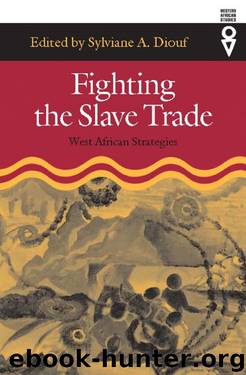Fighting the Slave Trade: West African Strategies by Sylviane A. Diouf

Author:Sylviane A. Diouf [Diouf, Sylviane A.]
Language: eng
Format: epub
Tags: Business & Money, Economics, History, Africa, Americas, Historical Study & Educational Resources, World, Slavery & Emancipation, Politics & Social Sciences, Social Sciences, Specific Demographics, African-American Studies, Sociology, Race Relations, Discrimination & Racism, Reference, West Africa, Social History, Race & Ethnicity, Special Groups
ISBN: 9780821441800
Amazon: B0057UDSYI
Publisher: Ohio University Press
Published: 2009-06-15T04:00:00+00:00
The Massacre of 1767
The massacre of 1767 was one of the most traumatic episodes in the history of the Old Calabar slave trade, at least until British withdrawal from the trade after 1807 (see Williams 1897, 536-48; Nair 1972, 24-25; Noah 1980, 17-19; Paley 2001; Sparkes 2002). Although accounts of this event do not always agree, contemporaries were united in suggesting that the massacre arose from a conspiracy of captains of several British ships and leading residents of Atakpa or Duke Town, to entrap those of Obuong, or Old Town.” The roots of the massacre seem to have lain in interward rivalry for control of the slave trade at Old Calabar following the founding of Atakpa around 1748, and in growing tensions between Obutong traders and British traders in the 1760s over recovery of debts. As one commentator noted, however, a critical factor in the entrapment of Obutong traders seems to have been their trust in the British to mediate in the rivalry with Atakpa.12 In the ensuing ambush, up to three hundred Obutong residents were slaughtered, according to contemporary reports. In addition, at least two sons of Robin John Ephraim, the head of Atkapa, were shipped, with an unknown number of others, as slaves to the Americas, while another son sought refuge with the captain of a British ship, who took him to Liverpool as a free man. With assistance from British merchants, all three sons subsequently returned to Obutong by 1773, six years after the massacre, each one having received some education in Britain (Williams 1897; Paley 2001; Sparkes 2002). Their return, however, could not prevent a decisive and permanent shift of control of the export slave trade from Obutong toward other wards, notably Atakpa. In this respect, the massacre of 1767 led to a palace revolution within the Efik elite that controlled the slave trade of Old Calabar.
Most discussions of the events of 1767-73 have centered on British involvement, but what is revealed about the protection from enslavement of Efik traders? The most obvious lesson was that such protection was more than a cultural or institutional issue; it was also a political issue. Thus, whatever the importance attaching to the various mechanisms identifying the Efik as insiders, interward rivalry or conflict could not only jeopardize but also actually undermine the protection that such mechanisms helped to create. British complicity in the massacre seems, indeed, to have depended on division within the Efik commercial elite as Atakpa vied with Obutong for control of trade at Old Calabar. At the same time, the willingness of the Duke family to conspire with the British may have reflected concerns about the damaging impact of Obutong’s debts on wider Anglo-Efik trade relations. In this respect, it is conceivable that the British were unknowingly used by the Efik leaders of Atakpa as instruments of Ekpe to help punish Obutong for failings that threatened the wider community’s interests. Be this as it may, the massacre seems to have shown that interward unity rather than disunity was essential to safeguard Efik traders from seizure and possible sale overseas.
Download
This site does not store any files on its server. We only index and link to content provided by other sites. Please contact the content providers to delete copyright contents if any and email us, we'll remove relevant links or contents immediately.
| African-American Studies | Asian American Studies |
| Disabled | Ethnic Studies |
| Hispanic American Studies | LGBT |
| Minority Studies | Native American Studies |
Cecilia; Or, Memoirs of an Heiress — Volume 1 by Fanny Burney(32558)
The Great Music City by Andrea Baker(32019)
Cecilia; Or, Memoirs of an Heiress — Volume 2 by Fanny Burney(31956)
Cecilia; Or, Memoirs of an Heiress — Volume 3 by Fanny Burney(31942)
We're Going to Need More Wine by Gabrielle Union(19046)
All the Missing Girls by Megan Miranda(16027)
Pimp by Iceberg Slim(14507)
For the Love of Europe by Rick Steves(14121)
Bombshells: Glamour Girls of a Lifetime by Sullivan Steve(14075)
Talking to Strangers by Malcolm Gladwell(13370)
Norse Mythology by Gaiman Neil(13365)
Fifty Shades Freed by E L James(13241)
Mindhunter: Inside the FBI's Elite Serial Crime Unit by John E. Douglas & Mark Olshaker(9343)
Crazy Rich Asians by Kevin Kwan(9292)
The Lost Art of Listening by Michael P. Nichols(7506)
Enlightenment Now: The Case for Reason, Science, Humanism, and Progress by Steven Pinker(7313)
The Four Agreements by Don Miguel Ruiz(6765)
Bad Blood by John Carreyrou(6621)
Weapons of Math Destruction by Cathy O'Neil(6280)
